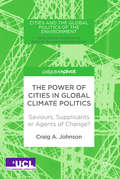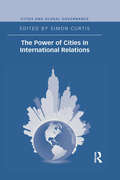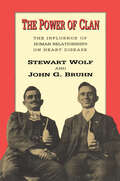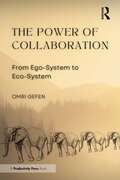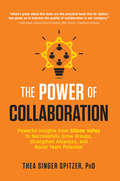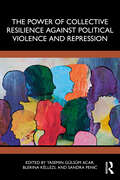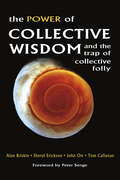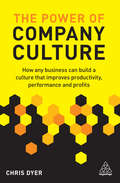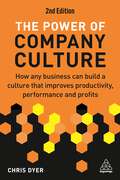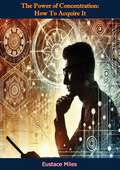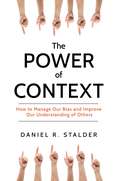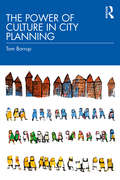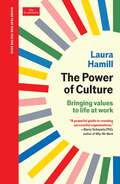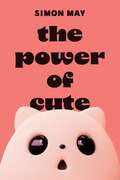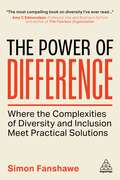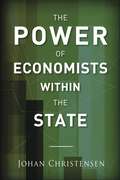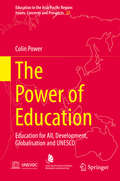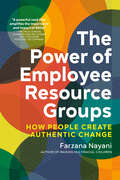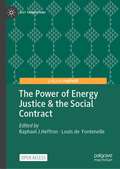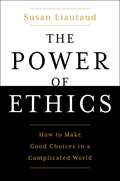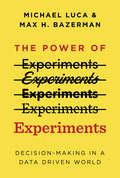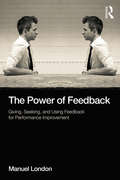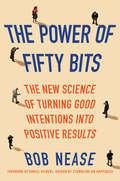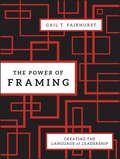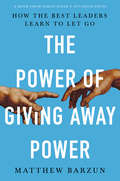- Table View
- List View
The Power of Cities in Global Climate Politics
by Craig A. JohnsonThere is now a palpable sense of optimism about the role of cities and transnational city-networks in global climate governance. Yet, amidst the euphoria, there is also a sense that the power that has been ascribed to – and frequently assumed by – cities has been overstated; that the power of cities and city-networks to make a difference in global climate politics is not what it appears. This book explores the implications of city-engagement in global climate politics, outlining a theoretical framework that can be used to understand the power of cities in relation to transnational city-networks, multinational corporations and nation-states. The book will be of interest to students and scholars of transnational governance, global environmental politics and climate change.
The Power of Cities in International Relations (Cities and Global Governance)
by Simon CurtisCities have become increasingly important to global politics, but have largely occupied a peripheral place in the academic study of International Relations (IR). This is a notable oversight for the discipline, although one which may be explained by IR’s traditional state centrism, the subjugation of the city to the demands of the territorial state in the modern period, and a lack of conceptual and analytical frameworks that can allow scholars to include the impact of cities within their work. Presenting case-specific scholarship from leading experts in the field, each contribution guides the reader through the changing nature of cities in the international system and their increasing prominence in global governance outcomes. The book features case studies on the financial power of cities, city action in the security domain, collaboration of cities in coping with environmental problems, transnational urban regions, and mayors as international actors to illustrate if the relationship between the city and the state has changed in profound ways, and how cities are empowered by structural changes in world politics. The multidisciplinary and global focus in The Power of Cities in International Relations sheds much needed light on the significance of the reemergence of cities from the long shadow of the nation-state. Only by examining the mechanisms that have empowered cities in the last few decades can we understand their new functions and capabilities in global politics.
The Power of Clan: Influence of Human Relationships on Heart Disease
by Stewart WolfMedical sociologists have long recognized the importance of community and family structure in the health of individuals. However, the past quarter century in America has seen an increasing emphasis on individualism and materialism that has effectively diminished the cohesiveness and emotional support provided by these basic social units. The Power of Clan examines the health effects of social change in a largely Italian-American town over a twenty-five-year period and provides substantial evidence of the protective effect of family bonds and shared social values against coronary heart disease and sudden death.The unique feature of the Roseto, Pennsylvania community was its remarkably low death rate from heart attacks, this in spite of the fact that such risk factors as smoking, lack of exercise, high fat and cholesterol diet were found to be just as prevalent in Roseto as in four nearby control towns. Roseto's traditional, family-oriented social structure, however, differed vastly from that of neighboring towns where materialistic values were predominant and where the individual, rather than the family, was considered to be the unit of society.At the beginning of their study in the early 1960s, the authors noted indications of imminent social change toward a more Americanized system of values and behavior. Interviews with younger inhabitants revealed much respect for old-world traditions but not as much enthusiasm for living by them. The study's prediction that the abandonment of selfless, communal standards would undermine Rosetans relative immunity to heart disease was borne out as death rates from heart attack climbed to levels comparable to those of the control towns by 1975. The Power of Clan is the product of twenty-five years of continuous observation. The findings of its original study have been carefully examined and its predictions largely confirmed. It is a landmark volume in the longitudinal study of health in an advanced industrial society. It also constitutes a large step forward in the cooperation of medical and sociological researchers.
The Power of Collaboration: From Ego-System to Eco-System
by Omri GefenThe future of human society depends on us. The only way to secure our children’s future is by Collaboration and trust. This world can be a better place for us and for all, and this is the main challenge and mission of leaders from all sectors and nations.This book is based on a new paradigm which can create the change we need. It reveals how to understand, analyze, create and improve all forms of Collaborations, with one central and powerful roadmap.Demonstrated by many examples from organizations, and based on a unique and innovated model, Gefen defines the "Architecture of Collaboration". He attempts to create a shared language – simple, structured and efficient – for one of the most significant challenges of this era.Gefen presents a warning mixed with a vision: the only chance for human society to deal successfully with the challenges of our time is by empowering Effective Collaboration, facilitated by the transformation from "Ego‑System" to "Eco‑System". Isn’t it clear that the only way to manage climate crises, pandemics, poverty, terrorism and other global concerns is together?Transformation is in the hands and is the responsibility of leaders and managers. This book is for them, in all sectors and roles.
The Power of Collaboration: Powerful Insights from Silicon Valley to Successfully Grow Groups, Strengthen Alliances, and Boost Team Potential
by Thea Singer SpitzerTo succeed these days your organization must create amazing results.Your employees and teams may be quite capable of handling their specific areas of focus, but unless you get them to work together, your products, services, and profits will suffer. While progress has been made, maximizing collaboration is still a challenge for many companies. They need a new approach.Over the last quarter century, California&’s Silicon Valley has become synonymous with building complex, successful businesses. Companies and leaders there have succeeded because they did more than apply existing business models—they created a new model for collaboration.Dr. Thea Singer Spitzer has combined her longstanding expertise on this subject with innovative thinking, research, and focused interviews with Silicon Valley leaders to create a practical framework for the next epoch of collaboration. The Power of Collaboration shows how any company, anywhere, can adapt to achieve its goals. This cutting-edge title features:Narratives about collaboration from top leaders in Silicon Valley.A sensible, straightforward collaboration framework.Positive, realistic hints for adapting that framework to your organization.With The Power of Collaboration as your guide, those amazing results will be surprisingly easy to achieve.
The Power of Collective Resilience Against Political Violence and Repression
byThis book outlines the importance of collective resilience for civilians in the face of war and political violence, examining how people develop social resources to confront adversity and foster meaningful change.Drawing on novel research from a range of diverse contexts, the book explores a nuanced picture of how political violence can lead to increased social cooperation and action within communities, as well as the well-documented negative dynamics. It brings together research into the collective resilience of civilians in the context of political violence and repression in three fields: psychological well-being, resistance and collective action, and reconciliation and peacebuilding. Chapters describe the underlying social-psychological processes behind collective resilience and discuss the limits and boundary conditions in the emergence of resilience. The contributors illustrate how communities leverage solidarity and shared identity to challenge divisive violence, pursue justive, and build sustainable peace, empasizing the importance of social processes in transforming harm into pathways for recovery, empowerment, and resilience.The Power of Collective Resilience Against Political Violence and Repression will be highly relevant reading for postgraduate students and academics in the fields of social and political psychology, and those researching intergroup relations, social change, peace, and conflict. It will also be of interest to activists interested in collective action and resilience.
The Power of Collective Wisdom: And the Trap of Collective Folly
by Alan Briskin Sheryl EricksonAn inspired and practical approach to developing the innate power of groups to make wise, compassionate, and creative decisions • Based on nine years of research involving scores of participants • Includes real-life examples and specific practices to help readers understand and cultivate collective wisdom and avoid collective folly If we are to disentangle the extraordinary challenges that we face today in organizations, communities, and nations we must transcend our divisions and develop solutions together. But what enables us to collectively make wise choices and sound judgments instead of splintering apart? When human beings gather together, a depth of awareness and insight, a transcendent knowing, becomes available. Based on nine years of research The Power of Collective Wisdom shows how we can tap into the extraordinary cocreative potential that exists in every group. Collective wisdom is elusive and unpredictable – it can’t be willed into being, but the authors describe six commitments people can adopt that will increase the likelihood of its appearing. Stories and historical examples throughout serve to illuminate and illustrate how collective wisdom has emerged in a range of settings and through the lives and traditions of varied cultures. Equally important, the authors describe how to recognize the pitfalls of polarization or false agreement, either of which can lead to collective folly – a phenomenon with which recent history has made us all too familiar. And they offer a set of practices to help readers maintain the key lessons of the book. The Power of Collective Wisdom is a foundational book for an emerging field of study and practice relevant to everyone seeking more effective and satisfying ways of working with others.
The Power of Company Culture: How Any Business Can Build a Culture That Improves Productivity, Performance and Profits
by Chris DyerCulture is the foundation for success in any organization. It's no coincidence that the companies with the strongest cultures not only consistently top the leaderboards of best places to work but also have the most engaged workforces, are the most in-demand employers and have the strongest financial performance. The Power of Company Culture debunks the myth that a remarkable company culture is something that a business either has or hasn't and shows how any company of any size can implement and maintain a world-class culture for business success.Structured around the seven pillars of culture success, The Power of Company Culture will show how to develop a company culture that improves productivity, performance, staff retention, company reputation and profits. Packed full of insights from leading practitioners at the forefront of developing outstanding company cultures including Michael Arena, Chief Talent Officer at General Motors, and Sheri Conaway, Director of People at Southwest Airlines, this is essential reading for all HR Managers and business leaders who are responsible for building, monitoring and managing culture in their organizations.
The Power of Company Culture: How Any Business can Build a Culture that Improves Productivity, Performance and Profits
by Chris DyerLearn how to enhance workforce performance, strengthen workforce retention and better your leadership by cultivating and expanding on your company's culture with The Power of Company Culture.This new edition provides detailed insights on the need for company transparency at work, the importance of a strong and positive culture and how leaders can go from supervising to supporting their teams to overall build a better work culture, all through hybrid and flexible working.This book shows how to develop a company culture that improves productivity, performance, staff retention, company reputation and profits. Packed full of insights from leading practitioners at the forefront of developing outstanding company cultures from global companies such as Vayner Media, General Motors and Southwest Airlines. This is essential reading for all HR Managers and business leaders who are responsible for building, monitoring and managing culture in their organizations.
The Power of Concentration: How To Acquire It
by Eustace Miles"The Power of Concentration: How To Acquire It" by Eustace Miles is a timeless guide that unlocks the secrets to developing and harnessing the incredible power of focused thought. In an era where distractions are abundant, Miles' insights remain as relevant and transformative as ever, offering readers practical strategies to enhance their mental discipline and achieve their goals.Drawing on his extensive experience as a renowned educator and athlete, Eustace Miles presents a compelling case for the vital role concentration plays in personal and professional success. Through clear, concise language, he outlines step-by-step methods for cultivating this essential skill, making the process accessible to readers of all backgrounds and levels of experience.Miles begins by explaining the fundamental principles of concentration, emphasizing the importance of a focused mind in overcoming challenges and achieving peak performance. He then delves into specific techniques designed to strengthen one's ability to concentrate, including mental exercises, visualization practices, and disciplined habits that promote sustained attention.Throughout the book, Miles provides practical examples and relatable anecdotes that illustrate the benefits of enhanced concentration in various aspects of life. Whether it's improving academic performance, excelling in sports, or advancing in one's career, the lessons contained in "The Power of Concentration" are universally applicable and deeply impactful."The Power of Concentration: How To Acquire It" also addresses common obstacles to concentration, such as procrastination, stress, and mental fatigue. Miles offers effective solutions for overcoming these barriers, enabling readers to maintain a clear and focused mind even in the face of adversity.Eustace Miles' classic work is an invaluable resource for anyone seeking to unlock their full potential through the power of concentrated thought. With its practical advice and timeless wisdom, this book remains a cornerstone for those committed to personal growth and achieving excellence in all areas of life.
The Power of Context: How to Manage Our Bias and Improve Our Understanding of Others
by Daniel R. StalderA social psychologist focuses on a very common yet rarely discussed bias called the "fundamental attribution error," showing how being aware of this bias can improve our day-to-day understanding of others.Social life involves making judgments about other people. Often these snap judgments turn out to be wrong when we overlook context. Social psychologists call this pervasive bias the "fundamental attribution error." This book explores the many ways in which this error creeps into our social interactions, frequently causing misunderstanding, hurt feelings, and negative treatment of others.Psychologist Daniel R. Stalder examines common examples of this error, from road rage and misinterpreting facial expressions to "gaydar," victim blaming, and prejudice. The common denominator in these diverse examples is that we falsely assume inherent traits or intentions while overlooking situational factors that might explain a person's behavior. Conversely in the actor-observer bias, we explain our own sometimes questionable behaviors by appealing to situational factors. For example, when you tailgate others, there's always a good reason, but when others tailgate you, they are obviously in the wrong.Stalder also reveals little-known information about classic studies of context, considers both the upsides and downsides to bias, and shares numerous strategies to reduce bias. Filled with interesting examples, new insights, and an abundance of research, this informative and entertaining book will help us understand each other and reduce conflict.
The Power of Culture in City Planning
by Tom BorrupThe Power of Culture in City Planning focuses on human diversity, strengths, needs, and ways of living together in geographic communities. The book turns attention to the anthropological definition of culture, encouraging planners in both urban and cultural planning to focus on characteristics of humanity in all their variety. It calls for a paradigm shift, re-positioning city planners’ "base maps" to start with a richer understanding of human cultures. Borrup argues for cultural master plans in parallel to transportation, housing, parks, and other specialized plans, while also changing the approach of city comprehensive planning to put people or "users" first rather than land "uses" as does the dominant practice. Cultural plans as currently conceived are not sufficient to help cities keep pace with dizzying impacts of globalization, immigration, and rapidly changing cultural interests. Cultural planners need to up their game, and enriching their own and city planners’ cultural competencies is only one step. Both planning practices have much to learn from one another and already overlap in more ways than most recognize. This book highlights some of the strengths of the lesser-known practice of cultural planning to help forge greater understanding and collaboration between the two practices, empowering city planners with new tools to bring about more equitable communities. This will be an important resource for students, teachers, and practitioners of city and cultural planning, as well as municipal policymakers of all stripes.
The Power of Culture: An Economist Edge Book (The Economist Edge Series)
by Laura HamillA revelatory new book showing how organizations need to be proactive about their culture—and how they can achieve that vital goal.All organizations have a culture, whether they acknowledge it or not—and whether it's helping or hindering them. Get it right, and culture can be a positive force for good. Get it wrong, and culture can be a negative force, becoming toxic and undermining performance and reputations. In short, culture matters. Organizational culture, though, can be a tricky thing to understand and master. The Power of Culture tackles this head-on, exploring what culture is, and why it matters; how it needs to be aligned with strategy and values; and how to understand it, change it, and make it a reality. Told through real stories and examples and using the author's Intentional Culture Circle as a guide, this new book helps everyone at work to be more aware of culture and how to find opportunities to use it for growth and success.
The Power of Cute
by Simon MayAn exploration of cuteness and its immense hold on us, from emojis and fluffy puppies to its more uncanny, subversive expressionsCuteness has taken the planet by storm. Global sensations Hello Kitty and Pokémon, the works of artists Takashi Murakami and Jeff Koons, Heidi the cross-eyed opossum and E.T.—all reflect its gathering power. But what does “cute” mean, as a sensibility and style? Why is it so pervasive? Is it all infantile fluff, or is there something more uncanny and even menacing going on—in a lighthearted way? In The Power of Cute, Simon May provides nuanced and surprising answers.We usually see the cute as merely diminutive, harmless, and helpless. May challenges this prevailing perspective, investigating everything from Mickey Mouse to Kim Jong-il to argue that cuteness is not restricted to such sweet qualities but also beguiles us by transforming or distorting them into something of playfully indeterminate power, gender, age, morality, and even species. May grapples with cuteness’s dark and unpindownable side—unnerving, artful, knowing, apprehensive—elements that have fascinated since ancient times through mythical figures, especially hybrids like the hermaphrodite and the sphinx. He argues that cuteness is an addictive antidote to today’s pressured expectations of knowing our purpose, being in charge, and appearing predictable, transparent, and sincere. Instead, it frivolously expresses the uncertainty that these norms deny: the ineliminable uncertainty of who we are; of how much we can control and know; of who, in our relations with others, really has power; indeed, of the very value and purpose of power.The Power of Cute delves into a phenomenon that speaks with strange force to our age.
The Power of Difference: Where the Complexities of Diversity and Inclusion Meet Practical Solutions
by Simon FanshaweGood intentions are not enough - real diversity is about change. This book explains why it's our differences and how we combine them that creates true diversity and generates innovation, fresh thinking and ultimately, success. With clarity and wit, The Power of Difference brings together the author's own experiences with the latest research to explain why inclusion is more than just being nice to people, why unconscious bias training isn't the fix we need and why listening to all individual voices, not just assuming that one viewpoint represents a group, is key. Offering insight, analysis and practical solutions, The Power of Difference is a must read for all managers, leaders and HR professionals as well as anyone looking to engage with the topic, who doesn't know where to start. Exploring how to confront bias, question assumptions and avoid generalizations, this book illustrates why diversity should be part of the overall business strategy, not separate from it. It shows how for innovation and diversity to flourish, we must create spaces that are safe for disagreement, not from disagreement. Written in an engaging yet practical style, this book courageously tackles some of the most significant issues at work today.
The Power of Economists within the State
by Johan ChristensenThe spread of market-oriented reforms has been one of the major political and economic trends of the late twentieth and early twenty-first centuries. Governments have, to varying degrees, adopted policies that have led to deregulation: the liberalization of trade; the privatization of state entities; and low-rate, broad-base taxes. Yet some countries embraced these policies more than others. Johan Christensen examines one major contributor to this disparity: the entrenchment of U. S. -trained, neoclassical economists in political institutions the world over. While previous studies have highlighted the role of political parties and production regimes, Christensen uses comparative case studies of New Zealand, Ireland, Norway, and Denmark to show how the influence of economists affected the extent to which each nation adopted market-oriented tax policies. He finds that, in countries where economic experts held powerful positions, neoclassical economics broke through with greater force. Drawing on revealing interviews with 80 policy elites, he examines the specific ways in which economists shaped reforms, relying on an activist approach to policymaking and the perceived utility of their science to drive change.
The Power of Education
by Colin PowerThis book is about the power of education: the kind of education that simultaneously improves the quality of life both of individuals and the wider society. It explains why education must be viewed as a basic human right, as a value in and of itself, and reviews the evidence on how education builds the human resources that individuals and nations need to be productive, to continue to learn, to solve problems, to be creative, and to live together and with nature in peace and harmony. When nations ensure that such an education is accessible to all throughout their lives, education becomes the engine of sustainable development - economic, social, moral and cultural. The book is unique in that it covers the development of education at all levels in all countries of the Asia-Pacific region and beyond, using the latest international data bases, while blending in analyses of both quantitate and qualitative research.
The Power of Employee Resource Groups: How People Create Authentic Change
by Farzana NayaniThis is the first authoritative book on building employee resource groups (ERGs) to empower underrepresented employees and positively impact diversity, equity, and inclusion (DEI) efforts within organizations and in society at large.In existence for decades, ERGs originated out of affirmative action policies and have evolved into powerful sources of employee activity and engagement. Organizations can leverage ERGs to support business goals, but ERGs can also play a critical role in creating a more inclusive work environment for marginalized individuals. ERGs represent a balance of serving company interests and empowering employees, offering the opportunity for innovative leadership within organizations. This book is a practical guide on how to manage ERGs effectively and how they inspire a deeper connection between employees and companies while helping us progress toward the DEI goals that we aim to accomplish. Participating in an ERG can help professionals of color and other historically excluded groups advance their careers, thereby increasing diverse representation in leadership. Farzana Nayani provides foundational tools for starting ERGs and outlines the five Ps-purpose, people, processes, planning, and priorities-needed to successfully operate them. Unlike other ERG handbooks, this book is people-centric and socially conscious and thoughtfully takes into account the experiences of employees and leaders during current times. It also serves as a deeper call to action around how ERGs can foster authentic change within organizations, creating transformative impact in the surrounding world.
The Power of Energy Justice & the Social Contract (Just Transitions)
by Raphael J. Heffron Louis De FontenelleThis open access book focuses on the energy sector and will make a significant contribution to its continued evolution. For many years, the energy sector has been missing a raison d’etre and now finally there are increased calls for that to be justice. Hence, this book will develop the concept of energy justice and how it needs to be formalised in a new ‘social contract’ with all stakeholders in society. The focus will be on improving legal systems at local, national and international levels while ensuring that justice is a core issue within energy law, the legal system and more broadly in society.
The Power of Ethics: How to Make Good Choices in a Complicated World
by Susan LiautaudThe essential guide for ethical decision-making in the 21st century. It&’s not your imagination: we&’re living in a time of moral decline. Publicly, we&’re bombarded with reports of government leaders acting against the welfare of their constituents; companies prioritizing profits over health, safety, and our best interests; and technology posing risks to society with few or no repercussions for those responsible. Personally, we may be conflicted about how much privacy to afford our children on the internet; how to make informed choices about our purchases and the companies we buy from; or how to handle misconduct we witness at home and at work. How do we find a way forward? Today&’s ethical challenges are increasingly gray, often without a clear right or wrong solution, causing us to teeter on the edge of effective decision-making. With concentrated power structures, rapid advances in technology, and insufficient regulation to protect citizens and consumers, ethics are harder to understand than ever. But in The Power of Ethics, Susan Liautaud shows how ethics can be used to create a sea change of positive decisions that can ripple outward to our families, communities, workplaces, and the wider world—offering unprecedented opportunity for good. Drawing on two decades as an ethics advisor guiding corporations and leaders, academic institutions, nonprofit organizations, and students in her Stanford University ethics courses, Susan Liautaud provides clarity to blurry ethical questions, walking you through a straightforward, four-step process for ethical decision-making you can use every day. Liautaud also explains the six forces driving virtually every ethical choice we face. Exploring some of today&’s most challenging ethics dilemmas and showing you how to develop a clear point of view, speak out with authority, make effective decisions, and contribute to a more ethical world for yourself and others, The Power of Ethics is the must-have ethics guide for the 21st century.
The Power of Experiments: Decision Making in a Data-Driven World (The\mit Press Ser.)
by Max H. Bazerman Michael LucaHow organizations—including Google, StubHub, Airbnb, and Facebook—learn from experiments in a data-driven world.Have you logged into Facebook recently? Searched for something on Google? Chosen a movie on Netflix? If so, you've probably been an unwitting participant in a variety of experiments—also known as randomized controlled trials—designed to test the impact of different online experiences. Once an esoteric tool for academic research, the randomized controlled trial has gone mainstream. No tech company worth its salt (or its share price) would dare make major changes to its platform without first running experiments to understand how they would influence user behavior. In this book, Michael Luca and Max Bazerman explain the importance of experiments for decision making in a data-driven world. Luca and Bazerman describe the central role experiments play in the tech sector, drawing lessons and best practices from the experiences of such companies as StubHub, Alibaba, and Uber. Successful experiments can save companies money—eBay, for example, discovered how to cut $50 million from its yearly advertising budget—or bring to light something previously ignored, as when Airbnb was forced to confront rampant discrimination by its hosts. Moving beyond tech, Luca and Bazerman consider experimenting for the social good—different ways that govenments are using experiments to influence or “nudge” behavior ranging from voter apathy to school absenteeism. Experiments, they argue, are part of any leader's toolkit. With this book, readers can become part of “the experimental revolution.”
The Power of Feedback: Giving, Seeking, and Using Feedback for Performance Improvement (Applied Psychology Series)
by Manuel LondonThis follow up to the 2003 edition of Job Feedback by Manuel London is updated to cover new research in the area of organizational management. This edition bridges a gap in research that now covers cultural responses to employer feedback, feedback through electronic communications, and how technology has changed the way teams work in organizations. The Power of Feedback includes examples of feedback from friends, family, colleagues, and volunteers in non-profit organizations. In this new book, both employers and employees will learn to view feedback as a positive tool for improving performance, motivation, and interpersonal relationships. Managers, human resource professionals, and students who will one day oversee teams will benefit from the research and advice found in The Power of Feedback.
The Power of Fifty Bits
by Bob NeaseEven with the very best of intentions, people often fail to make wise choices for themselves--whether for their health, their finances, or their business decisions. Yet it doesn't have to be that way--thanks to the science behind fifty bits design, a set of principles that helps close the gap between intentions and actual behaviors.Of the ten million bits of information our brains process each second, only fifty bits are devoted to conscious thought. This means that humans are wired for inattention and inertia, so we often choose without thinking and act against our own interests. Understanding this is the key to any behavior change, from increasing charitable donations to reducing unintended pregnancies.As the former chief scientist of Express Scripts, a Fortune 25 health care company, Bob Nease is an expert on applying behavioral sciences to the health care industry. He realized that providing financial incentives and tools--an approach that assumes patients will act rationally--was not having the outcome that he expected. Instead, he had to reengineer patients' environments in order for their natural inclinations to lead them to the best decisions. In a nod to the brain's fundamental cognitive limitation, he called this approach "fifty bits design," and now he applies his knowledge to the wider world, offering important, practical solutions that marketers, human resources professionals, teachers, and even parents can use to improve the behavior of others around them and get the positive results they want.Nease offers a set of powerful and effective strategies for change:* Require Choice: compel people to deliberately choose among options* Lock In Good Intentions: allow people to make decisions today about choices they will face in the future* Let It Ride: set the default to the desired option and let people opt out if they wish* Get in the Flow: home in on where people's attention is likely to go naturally* Reframe the Choices: set the framework people use to consider options and choices* Piggyback It: connect the desired choice or behavior with something people already like or are engaged in* Simplify...Wisely: make the right choices frictionless and easy; make the wrong choices more difficultThe Power of Fifty Bits is the first how-to guide that provides step-by-step instructions for helping customers, employees, co-workers, and clients get the results they truly want.Advance Praise for The Power of Fifty Bits"In many ways, this book is yet another one of Bob's cleverly engineered systems, expertly designed to hook you with an enigmatic title, hold you with delightful stories and deep ideas, and ultimately leave you better than you were before--wiser about people in general, and about yourself in particular."--from the foreword by Daniel Gilbert"Want to learn how to design approaches that spur others to achieve their goals--and that do the same for you and your own goals? With clarity, eloquence, and humor, The Power of Fifty Bits shows you how."--Robert B. Cialdini, author of Influence"If you want to understand how the environment you live in can be reshaped so that your intuitions, fears, hopes, and dreams can best be managed and aligned with your best intentions, I recommend you read this fun, challenging, and useful book."--Arthur Caplan, professor of bioethics, NYU Langone Medical Center"The Power of Fifty Bits shows you how to produce outcomes that have both high financial effectiveness and high acceptance by employees."--Bob Ihrie, SVP of Compensation and Benefits, Lowe's Companies, Inc."The Power of Fifty Bits is a great resource for creating state-of-the-art programs to promote well-being. Combining evidence for effective behavior change with practical advice, this book will transform your thinking and put you on a path to a much better life."--Helen Darling, strategic advisor, National Business Group on Health"Bob Nease is a pioneer of implementing social science in business and healthcare, and we are lucky to have him share his expertise."--Dan Ariely, author of Predictably Irrational"This book proves ...
The Power of Framing
by Fairhurst Gail T.Praise for The Power of Framing "The primary work of leadership involves managing meaning through framing. Fairhurst shows that the way leaders use language to frame people, situations, and events has important consequences for the way individuals make sense of the world and their actions. The Power of Framing is an accessible and inspirational read for leaders who want to shape their organizations in ethically responsible ways. "-J. Kevin Barge, professor, Texas A&M University "An ideal book for MBA students and business professionals who are interested in specific tools for constructing leadership in their professional worlds. By focusing on the language toolbox of leadership, the book empowers anyone to construct leadership through talk and interaction. " -Jolanta Aritz, associate professor, Center for Management Communication, USC Marshall School of Business "Building on her earlier acclaimed work, and written in a highly accessible style, Fairhurst's thoughtful study provides us with a practical and highly relevant analysis of the power of framing language from a leadership perspective. This is a must-have book. " -David Grant, professor of organizational studies, University of Sydney "Communication is the most important element of leadership, and framing of the subject and situation is one of the most powerful tools available to leaders. Gail Fairhurst has created the handbook to help leaders do this right. A must-read for anyone in a leadership capacity. " -Rich Kiley, venture capitalist, and retired Procter & Gamble marketing and HR executive "To be an effective global manager, there is nothing more critical than understanding how to frame an issue so that you are effectively communicating and motivating in a culturally sensitive manner. This book will tune you into these issues and show you how to make certain your communication is properly interpreted by your audience. " -Olga Jacob, general sales manager (Belgium, Netherlands, and Luxembourg), American Airlines
The Power of Giving Away Power: How the Best Leaders Learn to Let Go
by Matthew Barzun&“This book is a breakthrough. It&’s beautifully written, perfectly timed and heralds a new way forward. I&’m buying a dozen copies to share with friends and colleagues.&” -Seth Godin, Founder of altMBA and author of The Practice If you let go of hierarchy, chaos will reign...or so many leaders believe. But when leaders find the courage to distribute rather than hoard power, creativity multiplies, trust deepens, and inclusivity expands... and a new kind of order emerges.A few rare leaders have learned to embrace a new organizational shape and mindset: Constellations. Organizations designed as constellations are dynamic and flexible networks of distinct yet interwoven individuals. Each member of the team feels like a singular star and is also connected to others to form something greater. That is how Visa reimagined how we pay for things, how Wikipedia beat the richest company in the world and how Barack Obama and his grassroots team revolutionized political campaigning. These leaders did what most leaders dread – they gave away power. Barzun brilliantly layers lessons across history and industries with his own experiences as an internet entrepreneur, political organizer, and US ambassador to the United Kingdom and Sweden. The Power of Giving Away Power shows how the Constellation mindset shines in some of the most impactful organizations and innovations the world has ever known. And it encourages us all to recognize, as Barzun writes, "the power we can create by seeing the power in others" — and making the leap to lead. Together.
